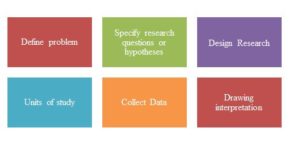In Brief
- You will find the best critical analysis and interpretation of information for future researchers enrolled in Business and Management.
- In order to identify the future research topics, we have reviewed the business and management (recent peer-reviewed studies) on critical analysis.
- Formulating hypothesis based on the reliable research questions
- Interpretation and critically evaluating the information based on the research questions and drawing a hypothesis around it.
Hypothesis
Formulating valid and reliable research questions is important link to find out and create a hypothesis through researching and providing a critical analysis. Good hypotheses should have meaningful characteristics, and should draw a clear rationale. It should be linked with the description of the relationship and help in finding variables of interest. While formulating the hypothesis, it should be linked to the research questions, findings and relating with the relationship having the first variable (number of bystanders) along with balancing it with the second variable (likelihood of receiving help) and finding the if-then format.

Formulating a valid hypothesis
When formulating valid research and literature, it is important to develop a hypothesis. The predictions for and against a statement can happen, depending on the particular research topic and through the reliable research questions. To formulate valid research the first step is to have the research question and prepare a specific analysis around it (Ghauri, 2020). It can help to give a direction to the future study. Subsequently, there can be a particular situation to the given condition involves the collection and relating it with the hypothesis, to derive logical meaning about the findings. The prediction can be around a particular theory.

To understand the hypotheses it should be linked with what the other individual can draw the matter out of it. It can have a clear rationale if necessary (Jung, 2019). Through the publications by researchers, it can help to provide the hypotheses. For example, as per the research, gender equity in college is related to the athletic programs, and the hypothesis was about the “female students showing the positive attitudes related to gender equity”. From another research study, it helped the identified the “people which can rate representatives and link with the own culture considering the attractiveness around the representatives of other cultures” As drawn from another research the formulation hypothesis can be based on the evidence, past instances and can be due to the research studies.
Reliable Research Questions
To be a good researcher, it is important to draw research-related content based on the research question originates with the idea. While formulating the hypothesis and having a valid formulation, it is important to have the research questions based on the research finding and finding adequate validated sources. While researching, the reliable research question can be based on the specific research hypothesis that can be done through the relationship evaluated from the validated hypothesis of independent and dependent variables. The researcher must carefully select and draw the interpretation of the formulated hypothesis which can be done through the appropriate levels of the independent variable and then linking it with the dependent variable (Villiers et al., 2019). Reliable research is done through an identification of a problem and then the process of the research questions or objectives helps to evaluate the best to answer such questions based on the findings of the information collected and how it has been collected, then subsequently how it can be formulated in the research question.
Hypothesis through the critical analysis
The hypothesis route generally begins with the problem and finding research. Due to the intentional research, the hypothesis through the critical analysis needs to be identified through research questions and finding the answers. It should also follow the choice of method and that can be linked with the question. It is important to choose the method that can provide the information you need to answer your research question that can be best. This is one reason why it is very important to be clear as to what you are asking. To identify the hypothesis, it has to involve the numerous choices and relate with the research process (Kumar, 2019). In the process of the hypothesis findings, it involves the four overlapping themes to find out the conceptual approach and relate with the philosophical underpinnings of research, having a research design and then finding the data collection along with finding a techniques. There is also assignment writing guidance, PhD dissertation writing help and more on various topics.
Interpretation of Information
The interpretation of information is based on the reliable research questions, formulation of hypothesis and finding key observations related to the selection of topics. The interpretation of the information is on the researched reliable questions and problems that can formulate hypothesis and including information.
Conclusion
To conclude, research is defined as the process along with finding the key stages involving a basic plan that can help to find out a conducted research. The research process involves a formulation of the value and the reliable research questions and finding a hypothesis based on the data, generating information and having a set knowledge, decision-making, which can help in an interpretation of information. Formulating valid and reliable research is an important step that involves reliable researched questions and creating a hypothesis through active research and providing a critical analysis around it.
References:
-
- Ghauri, P. Research Methods in Business Studies. https://books.google.co.in/books?hl=en&lr=&id=6tLKDwAAQBAJ&oi=fnd&pg=PR14&dq=Ghauri,+P.,+Gr%C3%B8nhaug,+K.,+%26+Strange,+R.+(2020).+Research+methods+in+business+studies.+Cambridge+University+
-
- Press&ots=7aj8Wk8Wpl&sig=B9tfwWfrQMgiLrMS0abX6y76Tkg#v=onepage&q=Ghauri%2C P.%2C Gr%C3%B8nhaug%2C K.%2C %26 Strange%2C R. (2020). Research methods in business studies. Cambridge University Press&f=false
-
- Jung, D. “Assessing citizen adoption of e-government initiatives in Gambia: A validation of the technology acceptance model in information systems success”. A critical article review, with questions to its publishers. Government Information Quarterly, 36 1, (2019), pp. 5–7. doi: 1016/j.giq.2018.11.003
-
- Kumar, R. Research methodology: A step-by-step guide for beginners. Sage Publications Limited. https://books.google.com/books?hl=en&lr=&id=J2J7DwAAQBAJ&oi=fnd&pg=PP1&dq=Kumar,+R.+(2019).+Research+methodology:+A+step-by-step+guide+for+beginners.+Sage+Publications+Limited.&ots=cutkAxLElh&sig=CXqJ-rBKWP6VGVGQ40e-U-1rjqs
- Villiers, C., Dumay, J., & Maroun, W. Qualitative accounting research: dispelling myths and developing a new research agenda. Accounting & Finance, 59 3, (2019), pp. 1459–1487. doi: 1111/acfi.12487
- How to develop mathematical theorems based on literature survey for PhD thesis? - December 28, 2020
- How big data analytics interacts with digital forensics. Mention the challenges, impacts and forensic solutions in it for writing a research proposal - November 24, 2020
- Explain the factors affecting the choice of title for PhD dissertation? - August 29, 2020

